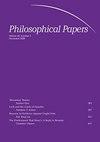非洲的发展与现代性:跨文化哲学视角
IF 1.3
3区 哲学
0 PHILOSOPHY
引用次数: 1
摘要
Joseph Agbakoba的《非洲的发展与现代性》是一部勇敢的、深刻的自我反思的、划时代的、彻底觉醒的作品。它实现了人类在传统非洲的基本代表和重建,以指导当代非洲。这一巨大成就是基于贯穿全文的两个主要特点。一个是,它将非洲人的注意力重新集中在他们自己身上,他们是过去、现在和未来每一段历史经历的主要推动者。另一个是,它强调了非洲人的生存关切、认识关切和创造力以及挥之不去的认识取向之间的联系。这些推动了非洲大陆的知识生成和研究议程。因此,这本书可以作为非洲人自我理解的一面镜子——关于他们自己、他们的行为,以及他们已经或可以对自己和环境做出什么。这本书包含了一个详尽的引言和七个争论不休的章节。第1章至第3章侧重于概念澄清和概念的哲学分析。第4章至第6章是对事实和虚构的历史呈现和解释学介入。第7章是一个重建项目。在那里,阿格巴科巴强调了如何提高对非洲今天和未来可能的自我完善的跨文化、互补和公正的理解。在这本目前被视为其代表作的书中,阿格巴科巴回应了非洲研究中的几个热点问题,尤其是非洲哲学。对于每一个问题,阿格巴科巴都强调了改善非洲人力资源和发展的途径。通过这样做,他削弱了新旧学术趋势的诱惑,这些趋势维持着欧洲大陆的不负责任和指责游戏。最近的这种趋势是寻求所谓的非殖民化。他回应的四个问题非常突出。他们关系密切,但我会尽量把他们分开。首先是非洲人对其过去和现在的困境以及发展危机的贡献和罪责程度这一挥之不去的问题。阿格巴科巴解释说,跨大西洋奴隶制不会有哲学论文本文章由计算机程序翻译,如有差异,请以英文原文为准。
Development and Modernity in Africa: An Intercultural Philosophical Perspective
Joseph Agbakoba’s Development and Modernity in Africa is at once courageous, deeply self-reflexive, epochal, and thoroughly awakening. It achieves a foundational representation and reconstruction of human agency in traditional Africa to guide contemporary Africa. This huge achievement is anchored on two main features that run throughout the text. One is that it refocuses Africans’ attention on themselves as the primary agents of every bit of their historical experiences—past, present, and the future. The other is that it highlights a connection among Africans’ existential concerns, epistemic concerns and creativity, and lingering epistemic orientation. These drive knowledge generation and research agenda on the continent. The book therefore qualifies as a mirror for self-understanding by Africans—about themselves, their actions, and what they have made or can make of themselves and context. The book contains an elaborate Introduction and seven tightly argued chapters. Chapters 1 to 3 focus on conceptual clarifications and philosophical analyses of concepts. Chapters 4 to 6 are a historical presentation of and hermeneutic engagement with facts and fictions. Chapter 7 is a reconstructive project. There, Agbakoba highlights how to improve trans-cultural, complementary, and just understanding of Africa’s possible self-improvement today and in the future. In this book, which for now qualifies as his magnum opus, Agbakoba responds to several burning issues in African studies generally and philosophy in Africa, in particular. For each issue, Agbakoba highlights paths to improved human agency and development in Africa. By doing this, he weakens the lure of old and new scholarly trends that sustain irresponsibility and blame-gaming on the continent. The most recent of such trends is the search for what is described as decolonization. Four of the issues he responded to stand out. They are closely related, but I will try to keep them separate. First is the lingering question of Africans’ contributions to and degree of culpability for their past and present predicaments, and development crises. Agbakoba explains that transatlantic slavery would not have Philosophical Papers
求助全文
通过发布文献求助,成功后即可免费获取论文全文。
去求助
来源期刊

Philosophical Papers
PHILOSOPHY-
CiteScore
2.10
自引率
0.00%
发文量
18
期刊介绍:
Philosophical Papers is an international, generalist journal of philosophy edited in South Africa Original Articles: Articles appearing in regular issues are original, high-quality, and stand-alone, and are written for the general professional philosopher. Submissions are welcome in any area of philosophy and undergo a process of peer review based on initial editor screening and refereeing by (usually) two referees. Special Issues: Topic-based special issues are comprised of both invited and submitted papers selected by guest editors. Recent special issues have included ''Philosophy''s Therapeutic Potential'' (2014, editor Dylan Futter); ''Aging and the Elderly'' (2012, editors Tom Martin and Samantha Vice); ''The Problem of the Criterion'' (2011, editor Mark Nelson); ''Retributive Emotions'' (2010, editor Lucy Allais); ‘Rape and its Meaning/s’ (2009, editor Louise du Toit). Calls for papers for upcoming special issues can be found here. Ideas for future special issues are welcome.
 求助内容:
求助内容: 应助结果提醒方式:
应助结果提醒方式:


